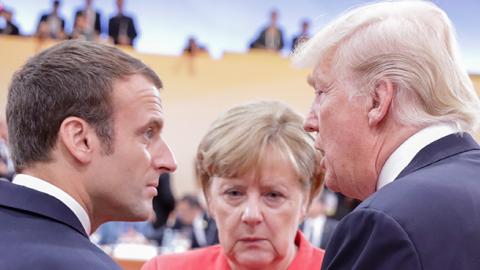U.S. trade policy has failed to evolve over the past decade, even as the political and economic environment has changed dramatically both domestically and world-wide. Donald Trump understood the political implications of this disconnect better than anyone he ran against, but as president his tactics have too often misfired and alienated allies at home and abroad. This week’s visits by French President Emmanuel Macron and German Chancellor Angela Merkel offer Mr. Trump an opportunity to undo some of the damage and bolster his case for an updated trade regime.
Why is change needed? A few reasons. After World War II, American economic hegemony permitted a benign approach to trade and outward investment. International commerce became an integral part of reviving the global economy and building alliances against communism. The equation dramatically shifted beginning in the 1970s, with the economic resurgence of Europe and East Asia, and shifted further after the Soviet Union collapsed in 1991.
Political support for open trade in the U.S. has eroded badly, as American producers faced new and more effective global competition and lost market share. Voters saw China’s rise as an economic power as the culmination of global trends undermining American industry and jobs. Economists have begun to rethink the effectiveness of the postwar trade regime, thanks to China’s blatant mercantilism, theft of intellectual property, distortive subsidies, and determination to displace Western industry. Efforts to integrate China into the postwar system and to encourage political liberalization have not met expectations.
The tools and rules of the World Trade Organization and of regional trade agreements have not kept up with the 21st-century economy. Rules for trade in new technologies and with state owned enterprises are ineffective, especially in the Chinese case. The WTO’s dispute-settlement mechanism is in shambles.
As China becomes more assertive militarily, American leaders and thinkers are beginning to recognize that national defense is intrinsically linked to a strong economic base. Commercial products are increasingly intertwined with advanced national-security requirements.
Many commentators on these pages and elsewhere have correctly emphasized that the most important policy reform of this administration was the 2017 tax law. Its international components and reduction of corporate tax rates will bolster the economic strength of U.S. businesses facing heightened global competition. It will be especially effective in reversing the incentives to move industrial production and high-tech profit centers abroad. The deregulatory wave also helps American businesses compete abroad. But so far the administration hasn’t succeeded in linking its domestic economic policy agenda with its trade priorities.
Mr. Trump’s unilateral imposition of tariffs, especially on steel and aluminum, alienated foreign and domestic allies whose cooperation he needs to pursue a more confrontational trade policy—even if some of them eventually got waivers. Europe and Japan are certainly not innocent of using tools like automobile and agricultural barriers to U.S. exports. But they have shown a willingness to work through to solve problems. The threat of tariffs certainly captured their attention and established a bargaining position. But it undermined the substantive case for working together.
There is growing recognition among U.S. allies that China is a serious threat to key industries. China blatantly uses its economic presence in Europe to influence European Union politics. That could help overcome traditional bureaucratic opposition in Brussels to challenging Chinese practices. Japan, Australia and New Zealand are all seeing a more aggressive Chinese political, economic and national-security presence as a threat.
Now that China has grown into a large and determined economic power, unilateral U.S. action can’t always succeed. Even if it could, cooperative work with allies makes the global trade order more responsive to the economic and political realities that gave rise to populism on both sides of the Atlantic. Part of the effort ought to involve serious reform of the WTO to meet the new realities of Chinese mercantilism.
Trump’s carrot-and-stick approach appears to have achieved some positive results in the negotiations to renew the U.S. Korea Free Trade Agreement, and possibly the North American Free Trade Agreement. China, South Korea and even Germany have signaled a willingness to negotiate in sectors such as automobiles. The Journal reports that Mr. Macron and Ms. Merkel will bring a new proposal to lower some auto and agricultural tariffs as part of a package for exemption from steel tariffs.
The flexible tactics in early negotiations show Mr. Trump’s ability to compromise. This flexibility will be needed in the more consequential talks to come with China and perhaps the Trans-Pacific Partnership. Polling shows strong support for Mr. Trump’s trade policies among his Republican and working-class base. Satisfying this electorate will require some new gains, especially for the industrial sector. Meeting the Chinese mercantilist challenge is a more ambitious project. Taking up the possible EU offer would be a step toward fulfilling that ambition.



















